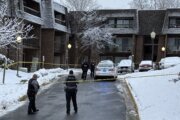The death toll and damage from Hurricane Helene continue to ramp up. The storm caused catastrophic damage across the Southeast and killed at least 166 people.
President Joe Biden plans to tour the destruction in the Carolinas on Wednesday.
Laura Lee, news director for Blue Ridge Public Radio in Asheville, North Carolina, joined WTOP’s Michelle Basch and John Aaron to provide some perspective from the ground, where more than 1.2 million people still have no power and rescuers are searching for people unaccounted for.
Listen to the full conversation:
Laura Lee: We have been nonstop trying to provide information to people about basic necessities. Across the region, people are without water, power, food and maybe most notably, internet. So communications have been really difficult. Fortunately, some people who are not able to communicate at all using internet or using their cellphones are able to get radio signals, so we have been trying to just push out as much information as possible for people to know how to access water, access food (in) these pretty dire circumstances.
Michelle Basch: Well, I understand people are getting more of a look now at the destruction that has been wrought there. Can you describe some of what you’re seeing around Asheville?
Lee: It’s catastrophic. It’s pretty horrific. We have widespread devastation. We were able to send a reporter into a place yesterday just north of here that had not been very accessible to us prior to that, and it’s completely flooded, covered in mud now trying to just dig out. We’re talking about recovery efforts, but we’re really still in search and rescue mode here. There are still people stranded, isolated. We don’t have good numbers about how many people are missing. We’re still getting lots of calls and messages about, how do I find my friend or family member that we have not been able to locate?
John Aaron: What sort of help do you know has been positioned in the area, and what help is on the way, and when might it get there?
Lee: Well, I think the most immediate help, at least in the Asheville areas, for water. The water system is completely down, and so we have distribution mechanisms. There were state and federal water that was supposed to be coming here. The city ended up buying some water to function at that first day of distribution, FEMA is going to be on the ground, and people can apply, and organizations can apply, but we really have immediate basic needs that we need to get met before people can even think about recovery.
Basch: What have you been going through yourself personally? Was this a surprise to you?
Lee: I think it’s fair to say it was a surprise to almost everyone. We knew there would be a storm. We knew we had had a lot of rain that had saturated the ground before, but we could not have imagined anything of this magnitude. Our reporters have been out. We lost touch with one of them for a couple of days because of the internet situation and the cellphone service situation. So I just can’t emphasize enough how widespread this is and how horrible this is in mountain terrain that can present a lot of problems for things like communications and transportation anyway.
Aaron: We can’t speak enough to the important work that you’re doing. Are you getting a chance to sleep here? How are you guys managing this technically?
Lee: We’re a small team. We’re a small public radio station, Blue Ridge Public Radio in Asheville, North Carolina. So we are camped out here, and we have a person in East Tennessee, and we have a person west of here. So we’re pretty much working around the clock to just try to get information out to people. We’ve heard that we air the briefings of the Buncombe County government every day at 10 and 4, and we’ve heard people gather around their crank radios in their neighborhood to listen, because it’s the one source of information that they’re able to get. So we’re working as hard as we can because we know this is vitally important for people’s basic needs.
Basch: And before we let you go, we want to let people who are listening to you on our air know if they want to help, what they should do.
Lee: We have a page on our site, bpr.org, that has a whole listing of ways to donate, ways to help. There are a lot of nonprofit organizations on top of the government-led efforts here that people could access, and we’re so grateful for all of the assistance.
Get breaking news and daily headlines delivered to your email inbox by signing up here.
© 2024 WTOP. All Rights Reserved. This website is not intended for users located within the European Economic Area.







